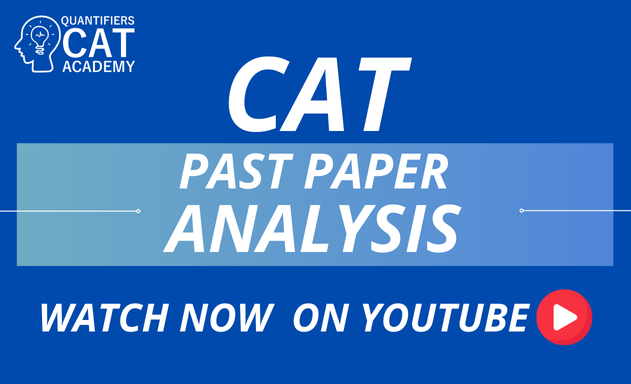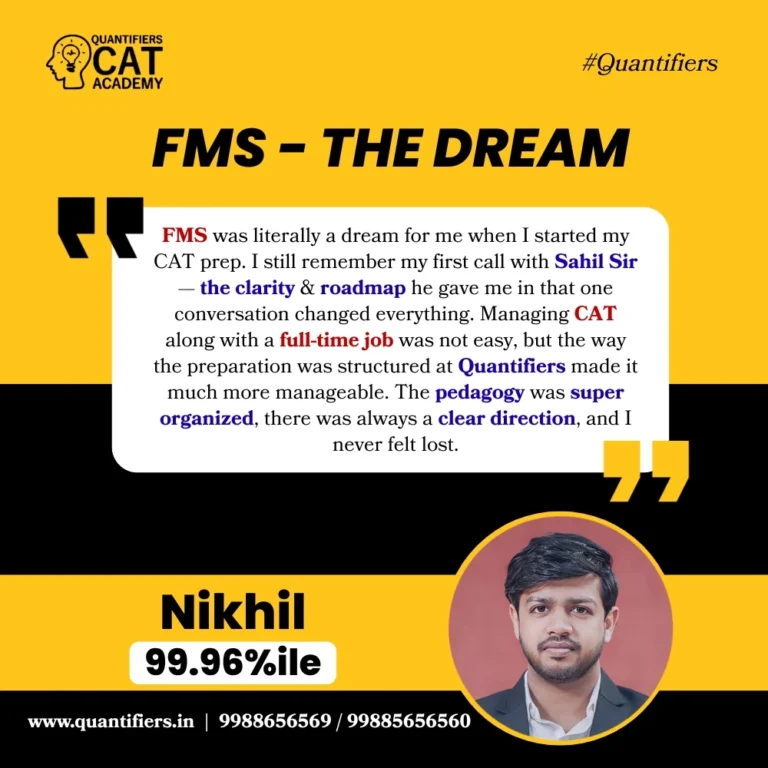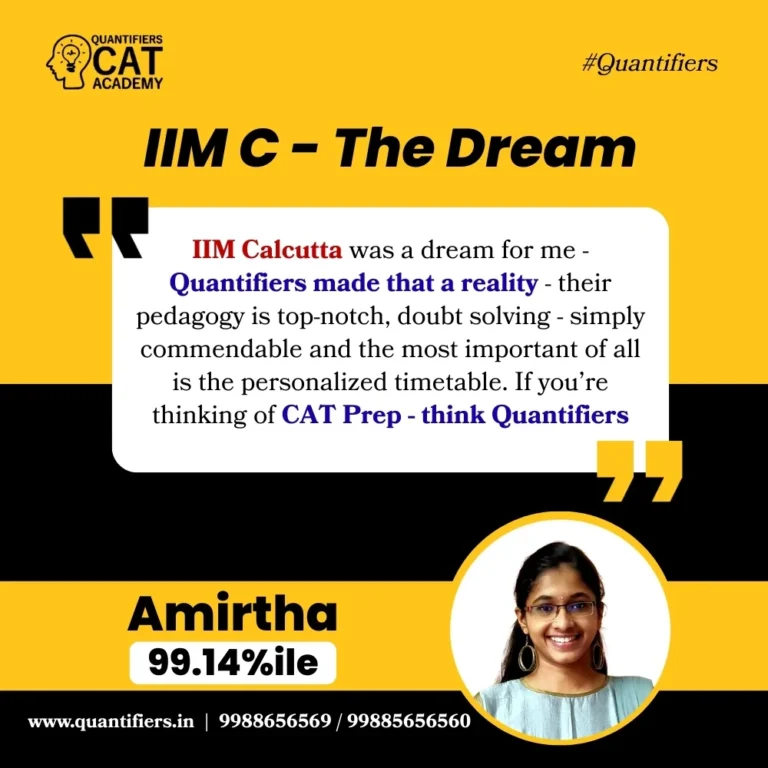CAT 2020 DILR - Slot 1 Past Year Questions
CAT 2020 | DILR Set 1
DIRECTIONS for the question: Read the information given below and answer the question that follows.
1000 patients currently suffering from a disease were selected to study the effectiveness of treatment of four types of medicines — A, B, C and D. These patients were first randomly assigned into two groups of equal size, called treatment group and control group. The patients in the control group were not treated with any of these medicines; instead they were given a dummy medicine, called placebo, containing only sugar and starch. The following information is known about the patients in the treatment group.
- A total of 250 patients were treated with type A medicine and a total of 210 patients were treated with type C medicine.
- 25 patients were treated with type A medicine only. 20 patients were treated with type C medicine only. 10 patients were treated with type D medicine only.
- 35 patients were treated with type A and type D medicines only. 20 patients were treated with type A and type B medicines only. 30 patients were treated with type A and type C medicines only. 20 patients were treated with type C and type D medicines only.
- 100 patients were treated with exactly three types of medicines.
- 40 patients were treated with medicines of types A, B and C, but not with medicines of type D. 20 patients were treated with medicines of types A, C and D, but not with medicines of type B.
- 50 patients were given all the four types of medicines. 75 patients were treated with exactly one type of medicine.
1. How many patients were treated with medicine type B?
From instruction we can say that these are 500 patients in treatment group and 500 patients in control group.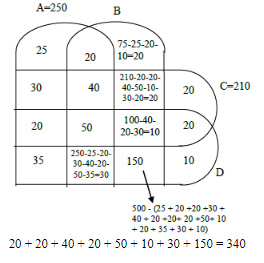
2. The number of patients who were treated with medicine types B, C and D, but not type A was:
From instruction we can say that these are 500 patients in treatment group and 500 patients in control group.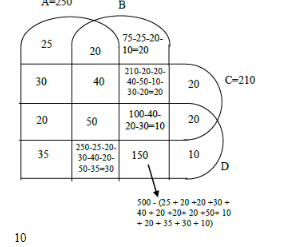
3. How many patients were treated with medicine types B and D only?
From instruction we can say that these are 500 patients in treatment group and 500 patients in control group.
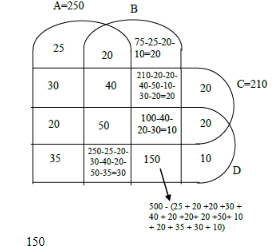
4. The number of patients who were treated with medicine type D was:?
From instruction we can say that these are 500 patients in treatment group and 500 patients in control group.
 20 + 50 + 10 + 20 + 35 + 30 + 150 + 10 = 325
20 + 50 + 10 + 20 + 35 + 30 + 150 + 10 = 325
Correct Answer 1
340
Correct Answer 2
10
Correct Answer 3
150
Correct Answer 4
325
CAT 2020 | DILR Set 2
DIRECTIONS for the question: Read the information given below and answer the question that follows.
Four institutes, A, B, C, and D, had contracts with four vendors W, X, Y, and Z during the ten calendar years from 2010 to 2019. The contracts were either multi-year contracts running for several consecutive years or single-year contracts. No institute had more than one contract with the same vendor. However, in a calendar year, an institute may have had contracts with multiple vendors, and a vendor may have had contracts with multiple institutes. It is known that over the decade, the institutes each got into two contracts with two of these vendors, and each vendor got into two contracts with two of these institutes.
The following facts are also known about these contracts.
- Vendor Z had at least one contract in every year.
- Vendor X had one or more contracts in every year up to 2015, but no contract in any year after that.
- Vendor Y had contracts in 2010 and 2019. Vendor W had contracts only in 2012.
- There were five contracts in 2012.
- There were exactly four multi-year contracts. Institute B had a 7-year contract, D had a 4- year contract, and A and C had one 3-year contract each. The other four contracts were single year contracts.
- Institute C had one or more contracts in 2012 but did not have any contract in 2011.
- Institutes B and D each had exactly one contract in 2012. Institute D did not have any contract in 2010.
5. In which of the following years were there two or more contracts?
- 2015
- 2017
- 2018
- 2016
Given that each institute have contract with two vendors
From I, II, and III facts given, we have
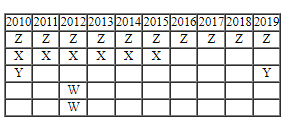 From the IV fact, we can say in 2012 there are five contracts. This means out of Z and X, one must be double.
If Z is double then the contract can be split into 3 years and 8 years which is not possible as given contract can be 7 years contract, 4 years contract, 3 years contract or one year contract.
∴ From 2012 to 2015, x will have a four year contract with D, as D did not have any contract in 2010.
C did not have a contract in 2011
∴ A will have contract with C from 2010 to 2012 and C must from contract with Z from 2017 to 2019 and initial 7 years contract of B with Z.
Since B and D have only one contract in 2012, ∴ W will have contract with A and C in 2012.
A and C already made contract with 2 vendors, we are left with B & D for single year contract. D didn’t have contract in 2010.
∴ D will have contract in 2019 with Y and B will have contract with Y in 2010.
Therefore the final table,
From the IV fact, we can say in 2012 there are five contracts. This means out of Z and X, one must be double.
If Z is double then the contract can be split into 3 years and 8 years which is not possible as given contract can be 7 years contract, 4 years contract, 3 years contract or one year contract.
∴ From 2012 to 2015, x will have a four year contract with D, as D did not have any contract in 2010.
C did not have a contract in 2011
∴ A will have contract with C from 2010 to 2012 and C must from contract with Z from 2017 to 2019 and initial 7 years contract of B with Z.
Since B and D have only one contract in 2012, ∴ W will have contract with A and C in 2012.
A and C already made contract with 2 vendors, we are left with B & D for single year contract. D didn’t have contract in 2010.
∴ D will have contract in 2019 with Y and B will have contract with Y in 2010.
Therefore the final table,

6. Which of the following is true?
- D had a contract with Y in 2019
- B had a contract with Z in 2017
- B had a contract with Y in 2019
- D had a contract with X in 2011
Given that each institute have contract with two vendors
From I, II, and III facts given, we have
 From the IV fact, we can say in 2012 there are five contracts. This means out of Z and X, one must be double.
If Z is double then the contract can be split into 3 years and 8 years which is not possible as given contract can be 7 years contract, 4 years contract, 3 years contract or one year contract.
∴ From 2012 to 2015, x will have a four year contract with D, as D did not have any contract in 2010.
C did not have a contract in 2011
∴ A will have contract with C from 2010 to 2012 and C must from contract with Z from 2017 to 2019 and initial 7 years contract of B with Z.
Since B and D have only one contract in 2012, ∴ W will have contract with A and C in 2012.
A and C already made contract with 2 vendors, we are left with B & D for single year contract. D didn’t have contract in 2010.
∴ D will have contract in 2019 with Y and B will have contract with Y in 2010.
Therefore the final table,
From the IV fact, we can say in 2012 there are five contracts. This means out of Z and X, one must be double.
If Z is double then the contract can be split into 3 years and 8 years which is not possible as given contract can be 7 years contract, 4 years contract, 3 years contract or one year contract.
∴ From 2012 to 2015, x will have a four year contract with D, as D did not have any contract in 2010.
C did not have a contract in 2011
∴ A will have contract with C from 2010 to 2012 and C must from contract with Z from 2017 to 2019 and initial 7 years contract of B with Z.
Since B and D have only one contract in 2012, ∴ W will have contract with A and C in 2012.
A and C already made contract with 2 vendors, we are left with B & D for single year contract. D didn’t have contract in 2010.
∴ D will have contract in 2019 with Y and B will have contract with Y in 2010.
Therefore the final table,
 D had a contract with Y in 2019
D had a contract with Y in 2019
7. In how many years during this period was there only one contract?
- 3
- 2
- 5
- 4
Given that each institute have contract with two vendors
From I, II, and III facts given, we have
 From the IV fact, we can say in 2012 there are five contracts. This means out of Z and X, one must be double.
If Z is double then the contract can be split into 3 years and 8 years which is not possible as given contract can be 7 years contract, 4 years contract, 3 years contract or one year contract.
∴ From 2012 to 2015, x will have a four year contract with D, as D did not have any contract in 2010.
C did not have a contract in 2011
∴ A will have contract with C from 2010 to 2012 and C must from contract with Z from 2017 to 2019 and initial 7 years contract of B with Z.
Since B and D have only one contract in 2012, ∴ W will have contract with A and C in 2012.
A and C already made contract with 2 vendors, we are left with B & D for single year contract. D didn’t have contract in 2010.
∴ D will have contract in 2019 with Y and B will have contract with Y in 2010.
Therefore the final table,
From the IV fact, we can say in 2012 there are five contracts. This means out of Z and X, one must be double.
If Z is double then the contract can be split into 3 years and 8 years which is not possible as given contract can be 7 years contract, 4 years contract, 3 years contract or one year contract.
∴ From 2012 to 2015, x will have a four year contract with D, as D did not have any contract in 2010.
C did not have a contract in 2011
∴ A will have contract with C from 2010 to 2012 and C must from contract with Z from 2017 to 2019 and initial 7 years contract of B with Z.
Since B and D have only one contract in 2012, ∴ W will have contract with A and C in 2012.
A and C already made contract with 2 vendors, we are left with B & D for single year contract. D didn’t have contract in 2010.
∴ D will have contract in 2019 with Y and B will have contract with Y in 2010.
Therefore the final table,

8. What BEST can be concluded about the number of contracts in 2010?
- At least 3
- At least 4
- Exactly 3
- Exactly 4
Given that each institute have contract with two vendors
From I, II, and III facts given, we have
 From the IV fact, we can say in 2012 there are five contracts. This means out of Z and X, one must be double.
If Z is double then the contract can be split into 3 years and 8 years which is not possible as given contract can be 7 years contract, 4 years contract, 3 years contract or one year contract.
∴ From 2012 to 2015, x will have a four year contract with D, as D did not have any contract in 2010.
C did not have a contract in 2011
∴ A will have contract with C from 2010 to 2012 and C must from contract with Z from 2017 to 2019 and initial 7 years contract of B with Z.
Since B and D have only one contract in 2012, ∴ W will have contract with A and C in 2012.
A and C already made contract with 2 vendors, we are left with B & D for single year contract. D didn’t have contract in 2010.
∴ D will have contract in 2019 with Y and B will have contract with Y in 2010.
Therefore the final table,
From the IV fact, we can say in 2012 there are five contracts. This means out of Z and X, one must be double.
If Z is double then the contract can be split into 3 years and 8 years which is not possible as given contract can be 7 years contract, 4 years contract, 3 years contract or one year contract.
∴ From 2012 to 2015, x will have a four year contract with D, as D did not have any contract in 2010.
C did not have a contract in 2011
∴ A will have contract with C from 2010 to 2012 and C must from contract with Z from 2017 to 2019 and initial 7 years contract of B with Z.
Since B and D have only one contract in 2012, ∴ W will have contract with A and C in 2012.
A and C already made contract with 2 vendors, we are left with B & D for single year contract. D didn’t have contract in 2010.
∴ D will have contract in 2019 with Y and B will have contract with Y in 2010.
Therefore the final table,
 Exactly 3
Exactly 3
9.Which institutes had multiple contracts during the same year?
- B only
- A and B only
- B and C only
- A only
Given that each institute have contract with two vendors
From I, II, and III facts given, we have
 From the IV fact, we can say in 2012 there are five contracts. This means out of Z and X, one must be double.
If Z is double then the contract can be split into 3 years and 8 years which is not possible as given contract can be 7 years contract, 4 years contract, 3 years contract or one year contract.
∴ From 2012 to 2015, x will have a four year contract with D, as D did not have any contract in 2010.
C did not have a contract in 2011
∴ A will have contract with C from 2010 to 2012 and C must from contract with Z from 2017 to 2019 and initial 7 years contract of B with Z.
Since B and D have only one contract in 2012, ∴ W will have contract with A and C in 2012.
A and C already made contract with 2 vendors, we are left with B & D for single year contract. D didn’t have contract in 2010.
∴ D will have contract in 2019 with Y and B will have contract with Y in 2010.
Therefore the final table,
From the IV fact, we can say in 2012 there are five contracts. This means out of Z and X, one must be double.
If Z is double then the contract can be split into 3 years and 8 years which is not possible as given contract can be 7 years contract, 4 years contract, 3 years contract or one year contract.
∴ From 2012 to 2015, x will have a four year contract with D, as D did not have any contract in 2010.
C did not have a contract in 2011
∴ A will have contract with C from 2010 to 2012 and C must from contract with Z from 2017 to 2019 and initial 7 years contract of B with Z.
Since B and D have only one contract in 2012, ∴ W will have contract with A and C in 2012.
A and C already made contract with 2 vendors, we are left with B & D for single year contract. D didn’t have contract in 2010.
∴ D will have contract in 2019 with Y and B will have contract with Y in 2010.
Therefore the final table,
 A and B only (In 2010 ⇒ BZ and BY, In 2012 ⇒ AX and AW)
A and B only (In 2010 ⇒ BZ and BY, In 2012 ⇒ AX and AW)
10. Which institutes and vendors had more than one contracts in any year?
- A, B, W, and X
- A, D, W, and Z
- B, D, W, and X
- B, W, X, and Z
Given that each institute have contract with two vendors
From I, II, and III facts given, we have
 From the IV fact, we can say in 2012 there are five contracts. This means out of Z and X, one must be double.
If Z is double then the contract can be split into 3 years and 8 years which is not possible as given contract can be 7 years contract, 4 years contract, 3 years contract or one year contract.
∴ From 2012 to 2015, x will have a four year contract with D, as D did not have any contract in 2010.
C did not have a contract in 2011
∴ A will have contract with C from 2010 to 2012 and C must from contract with Z from 2017 to 2019 and initial 7 years contract of B with Z.
Since B and D have only one contract in 2012, ∴ W will have contract with A and C in 2012.
A and C already made contract with 2 vendors, we are left with B & D for single year contract. D didn’t have contract in 2010.
∴ D will have contract in 2019 with Y and B will have contract with Y in 2010.
Therefore the final table,
From the IV fact, we can say in 2012 there are five contracts. This means out of Z and X, one must be double.
If Z is double then the contract can be split into 3 years and 8 years which is not possible as given contract can be 7 years contract, 4 years contract, 3 years contract or one year contract.
∴ From 2012 to 2015, x will have a four year contract with D, as D did not have any contract in 2010.
C did not have a contract in 2011
∴ A will have contract with C from 2010 to 2012 and C must from contract with Z from 2017 to 2019 and initial 7 years contract of B with Z.
Since B and D have only one contract in 2012, ∴ W will have contract with A and C in 2012.
A and C already made contract with 2 vendors, we are left with B & D for single year contract. D didn’t have contract in 2010.
∴ D will have contract in 2019 with Y and B will have contract with Y in 2010.
Therefore the final table,
 A, B, W and X
A, B, W and X
Correct Answer 5
Option A
Correct Answer 6
Option A
Correct Answer 7
Option A
Correct Answer 8
Option C
Correct Answer 9
Option B
Correct Answer 10
Option A
CAT 2020 | DILR Set 3
DIRECTIONS for the question: Go through the graph and the information given below and answer the question that follows.
In a certain board examination, students were to appear for examination in five subjects: English, Hindi, Mathematics, Science and Social Science. Due to a certain emergency situation, a few of the examinations could not be conducted for some students. Hence, some students missed one examination and some others missed two examinations. Nobody missed more than two examinations.
The board adopted the following policy for awarding marks to students. If a student appeared in all five examinations, then the marks awarded in each of the examinations were on the basis of the scores obtained by them in those examinations.
If a student missed only one examination, then the marks awarded in that examination was the average of the best three among the four scores in the examinations they appeared for.
If a student missed two examinations, then the marks awarded in each of these examinations was the average of the best two among the three scores in the examinations they appeared for.
The marks obtained by six students in the examination are given in the table below. Each of them missed either one or two examinations.

The following facts are also known
- Four of these students appeared in each of the English, Hindi, Science, and Social Science examinations.
- The student who missed the Mathematics examination did not miss any other examination.
- One of the students who missed the Hindi examination did not miss any other examination.
The other student who missed the Hindi examination also missed the Science examination.
11. Who among the following did not appear for the Mathematics examination?
- Carl
- Alva
- Foni
- Esha

12. Which students did not appear for the English examination?
- Carl and Deep
- Esha and Foni
- Alva and Bithi
- Cannot be determined
As the marks in the missing exam in the average of the remaining marks (according to different condition) and we know average can neither be least nor maximum. ∴ Alva Bithi, Carl and Deep are eliminated. ∴ Answer will be Esha and Foni
13. What BEST can be concluded about the students who did not appear for the Hindi examination?
- Alva and Esha
- Alva and Deep
- Deep and Esha
- Two among Alva, Deep and Esha

14. What BEST can be concluded about the students who missed the Science examination?
- Alva and Bithi
- Deep and Bithi
- Alva and Deep
- Bithi and one out of Alva and Deep
From the table, we can see Bithi missed the Science paper definitely but we are not sure of Alva and Deep. One out of Alva and Deep will definitely miss the Science exam
15. How many out of these six students missed exactly one examination?
We can see that Esha, Carl and one out of Alva or Deep missed one examination.
16. For how many students can we be definite about which examinations they missed?
We are definite about Bithi, Carl, Esha and Foni
Correct Answer 11
Option A
Correct Answer 12
Option B
Correct Answer 13
Option B
Correct Answer 14
Option D
Correct Answer 15
3
Correct Answer 16
4
CAT 2020 | DILR Set 4
DIRECTIONS for the question: Go through the graph and the information given below and answer the question that follows.
The local office of the APP-CAB company evaluates the performance of five cab drivers, Arun, Barun, Chandan, Damodaran, and Eman for their monthly payment based on ratings in five different parameters (P1 to P5) as given below:
P1: timely arrival
P2: behaviour
P3: comfortable ride
P4: driver’s familiarity with the route
P5: value for money
Based on feedback from the customers, the office assigns a rating from 1 to 5 in each of these parameters. Each rating is an integer from a low value of 1 to a high value of 5. The final rating of a driver is the average of his ratings in these five parameters. The monthly payment of the drivers has two parts – a fixed payment and final rating-based bonus. If a driver gets a rating of 1 in any of the parameters, he is not eligible to get bonus. To be eligible for bonus a driver also needs to get a rating of five in at least one of the parameters.
The partial Information related to the ratings of the drivers in different parameters and the monthly payment structure (in rupees) is given in the table below:

The following additional facts are known.
- Arun and Barun have got a rating of 5 in exactly one of the parameters. Chandan has got a rating of 5 in exactly two parameters.
- None of drivers has got the same rating in three parameters.
17. If Damodaran does not get a bonus, what is the maximum possible value of his final rating?
- 3.6
- 3.8
- 3.2
- 3.4
We have to maximize the rating of Damodaran, taking care that he did not get the bonus. ∴ Damodaran = 5 +5 + 3 +4+ 1 = 18 ∴ Rating = 18/5 = 3.6
18. If Eman gets a bonus, what is the minimum possible value of his final rating?
- 3.4
- 2.8
- 3.0
- 3.2
We have to minimize the rating of Eman, taking care that Eman will get bonus. ∴ Eman = 5 + 3 + 3 + 2 + 2 = 15 ∴ Rating = 15/5 = 3.0
19. If all five drivers get bonus, what is the minimum possible value of the monthly payment (in rupees) that a driver gets?
- 1700
- 1740
- 1750
- 1600
As, we have to find the minimum possible value of monthly payment is mean we need to find the payment of ill the drivers, keeping their rating minimum and all drivers will get the bonus. Arun = 5 + 2 + 2 + 4 3 + = 16 Arun Rating = 16/5 = 3.2 ∴ Arun payment = 1000 + 3.2 × 250 = 1800 Barun = 3 + 5 + 2 + 2 + 3 = 15 Barun Rating = 15/5 = 3.0 ∴ Barun payment = 1200 + 200 × 3 = 1800 Chandan = 5 + 5 + 2 + 2 +3 = 17 Chandan Rating = 17/5 = 3.4 Chandan Payment = 1400+ 3.4 × 100 = 1740 Damodaran = 5 + 3 + 3 + 2 + 2 Damodaran Rating = 15/5 = 3.0 ∴ Damodaran payment = 1300 + 150× 3 = 1750 Eman = 5 + 3 + 3 + 2 +2 = 15 Eman Rating = 15/5 = 3.0 ∴ Eman Payment = 1100+ 200×3 = 1700 ∴ Eman payment will be minimum i.e. 1700
20. If all five drivers get bonus, what is the maximum possible value of the monthly payment (in rupees) that a driver gets?
- 1960
- 1950
- 2050
- 1900
Now we have to maximize the rating of all five drivers Arun = 5 + 4 + 3 + 4 + 3 = 19. Rating = 19/5 = 3.80 ∴ Arun Payment = 1000 + 3.8 × 250 = 1950 Barun = 3 + 5 + 4 + 4 + 3. Rating = 19/5 = 3.80 ∴ Barun Payment = 1200 + 200 × 3.80 = 1960 Chandan = 5 + 5 + 2 + 4 + 4 = 20. Rating = 20/5 = 4.0 ∴ Chandan Payment = 1400 + 100 × 4 = 1800 Damodaran = 5 + 3 5 + 4 + 4 = 21 Rating = 21/5 = 4.2 ∴ Damodaran Payment = 1300 + 150 × 4.2 = 1930 Eamn = 5 + 5 + 4 + 4 +2 = 20. Rating = 20/5 = 4.0 ∴ Eman payment = 100 + 200 × 4 = 1900 ∴ Barun’s payment is maximum i.e. 1960
Correct Answer 17
Option A
Correct Answer 18
Option C
Correct Answer 19
Option A
Correct Answer 20
Option A
CAT 2020 | DILR Set 5
DIRECTIONS for the question: Read the information given below and answer the question that follows.
Ten musicians (A, B, C, D, E, F, G, H, I and J) are experts in at least one of the following three percussion instruments: tabla, mridangam, and ghatam. Among them, three are experts in tabla but not in mridangam or ghatam, another three are experts in mridangam but not in tabla or ghatam, and one is an expert in ghatam but not in tabla or mridangam. Further, two are experts in tabla and mridangam but not in ghatam, and one is an expert in tabla and ghatam but not in mridangam.
The following facts are known about these ten musicians.
- Both A and B are experts in mridangam, but only one of them is also an expert in tabla.
- D is an expert in both tabla and ghatam.
- Both F and G are experts in tabla, but only one of them is also an expert in mridangam.
- Neither I nor J is an expert in tabla.
- Neither H nor I is an expert in mridangam, but only one of them is an expert in ghatam.
21. Who among the following is DEFINITELY an expert in tabla but not in either mridangam or ghatam?
- C
- F
- H
- A
After Reading the passage
After reading instruction point 1, 2, 3
4th point says that neither I nor J is an expert in Tabla. After combing 4th and 5th point. We can definitely say that, I must play only Ghatam, This means H must play only Tabla
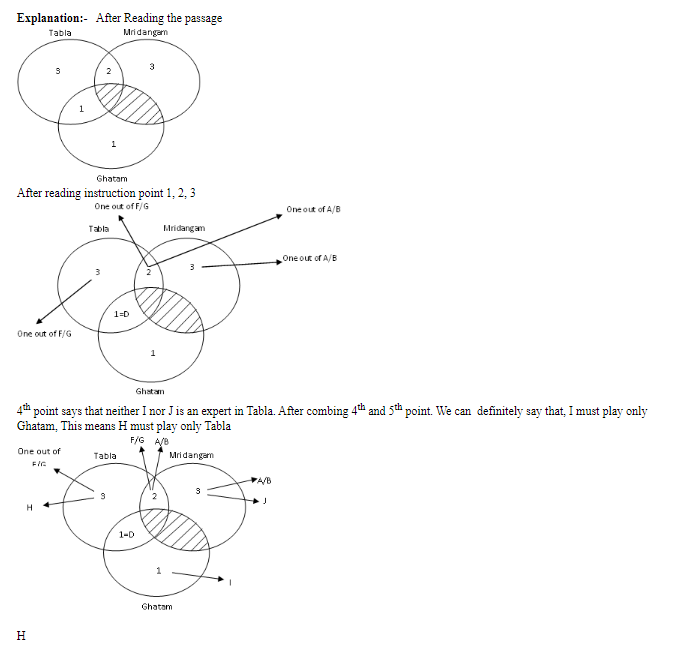
22. Who among the following is DEFINITELY an expert in mridangam but not in either tabla or ghatam?
- B
- E
- J
- G

23. Which of the following pairs CANNOT have any musician who is an expert in both tabla and mridangam but not in ghatam?
- A and B
- F and G
- C and E
- C and F
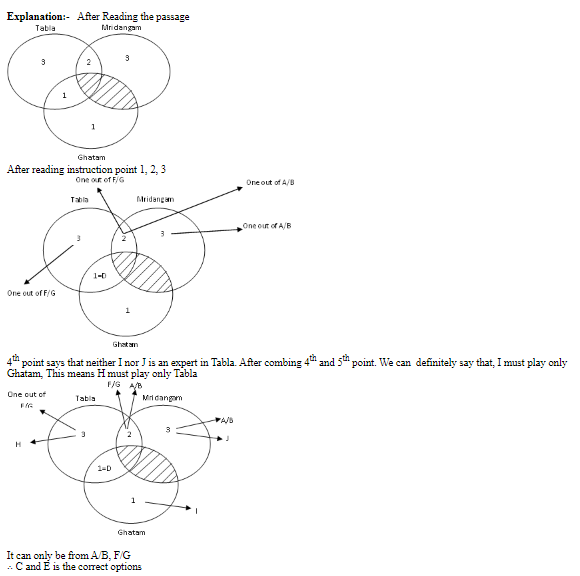
24. If C is an expert in mridangam and F is not, then which are the three musicians who are experts in tabla but not in either mridangam or ghatam?
- E, F and H
- C, E and G
- E, G and H
- C, G and H
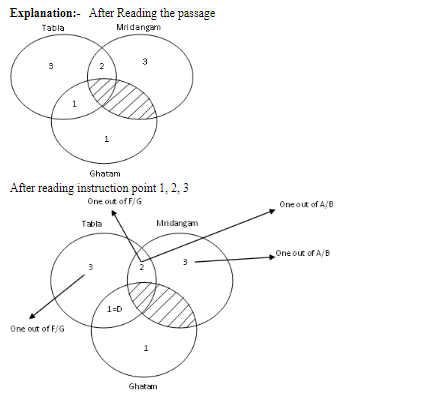
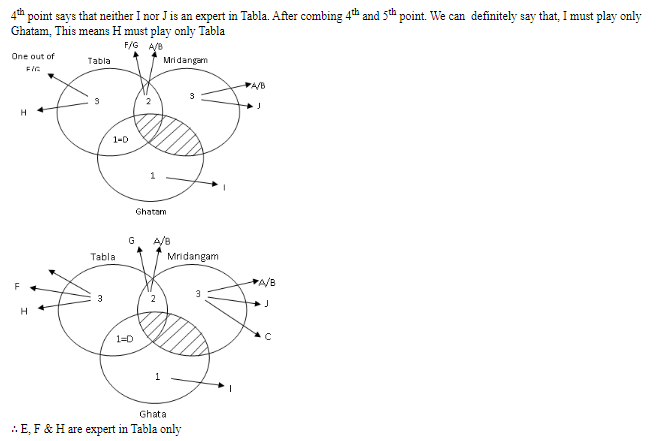
Correct Answer 21
Option C
Correct Answer 22
Option C
Correct Answer 23
Option C
Correct Answer 24
Option A

